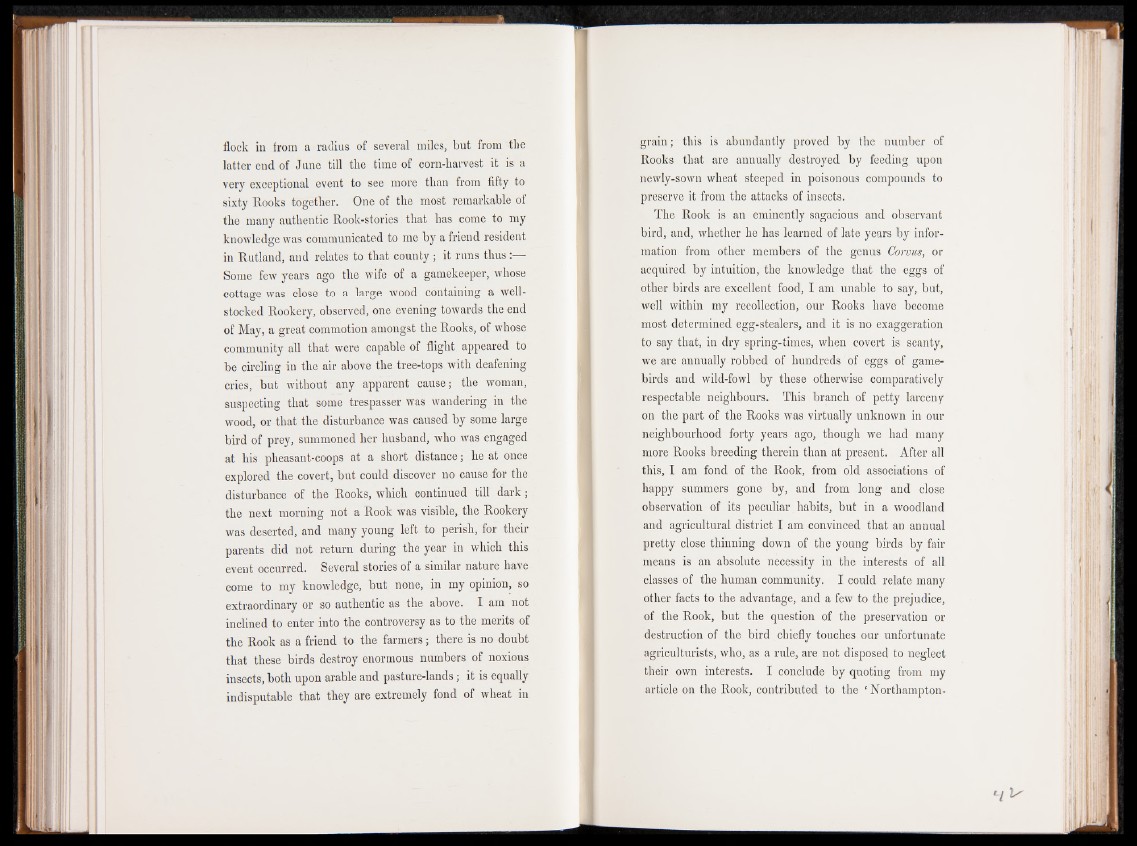
flock in from a radius of several miles, but from the
latter end of June till the time of corn-harvest it is a
very exceptional event to see more than from fifty to
sixty Rooks together. One of the most remarkable of
the many authentic Rook-stories. that has come to my
knowledge was communicated to me by a friend resident
in Rutland, and relates to that county ; it runs thus :—
Some few years ago the wife of a gamekeeper, whose
cottage was close to a large wood containing a well-
stocked Rookery, observed, one evening towards the end
of May, a great commotion amongst the Rooks, of whose
community all that were capable of flight appeared to
be circling in the air above the tree-tops with deafening
cries, but without any apparent cause; the woman,
suspecting that some trespasser was wandering in the
wood, or that the disturbance was caused by some large
bird of prey, summoned her husband, who was engaged
at his pheasant-coops at a short distance; he at once
explored the covert, but could discover no cause for the
disturbance of the Rooks, which continued till dark;
the next morning not a Rook was visible, the Rookery
was deserted, and many young left to perish, for their
parents did not return during the year in which this
event occurred. Several stories of a similar nature have
come to my knowledge, but none, in my opinion, so
extraordinary or so authentic as the above. I am not
inclined to enter into the controversy as to the merits of
the Rook as a friend to the farmers; there is no doubt
that these birds destroy enormous numbers of noxious
insects, both upon arable and pasture-lands; it is equally
indisputable that they are extremely fond of wheat in
grain; this is abundantly proved by the number of
Rooks that are annually destroyed by feeding upon
newly-sown wheat steeped in poisonous compounds to
preserve it from the attacks of insects.
The Rook is an eminently sagacious and observant
bird, and, whether he has learned of late years by information
from other members of the genus Corvus, or
acquired by intuition, the knowledge that the eggs of
other birds are excellent food, I am unable to say, but,
well within my recollection, our Rooks have become
most determined egg-stealers, and it is no exaggeration
to say that, in dry spring-times, when covert is scanty,
we are annually robbed of hundreds' of eggs of gamebirds
and wild-fowl by these otherwise comparatively
respectable neighbours. This branch of petty larceny
on the part of the Rooks was virtually unknown in our
neighbourhood forty years ago, though we had many
more Rooks breeding therein than at present. After all
this, I am fond of the Rook, from old associations of
happy summers gone by, and from long and close
observation of its peculiar habits, but in a woodland
and agricultural district I am convinced that an annual
pretty close thinning down of the young birds by fair
means is an absolute necessity in the interests of all
classes of the human community. I could relate many
other facts to the advantage, and a few to the prejudice,
of the Rook, but the question of the preservation or
destruction of the bird chiefly touches our unfortunate
agriculturists, who, as a rule, are not disposed to neglect
their own interests. I conclude by quoting from my
article on the Rook, contributed to the ‘Northampton